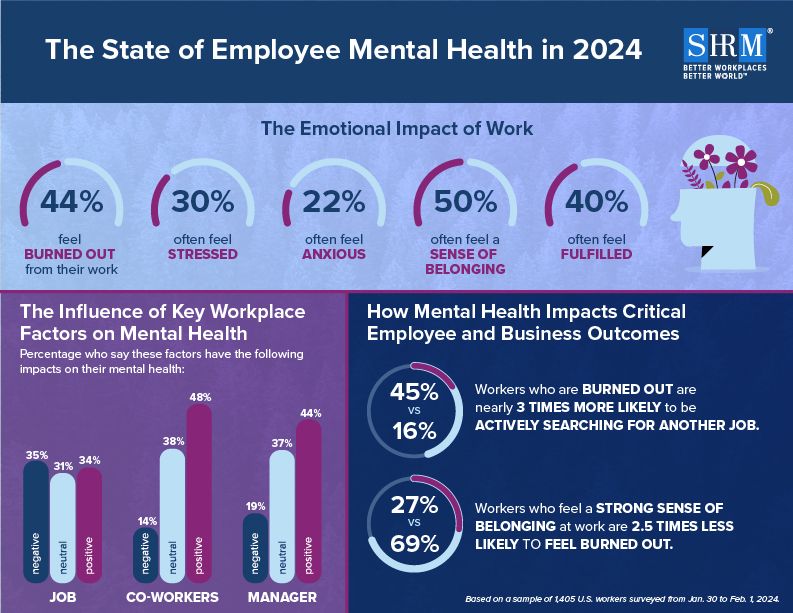New data from SHRM Research finds that roughly half of workers feel depleted at the end of the day, while almost as many experience burnout. The research highlights the need for HR to address employee mental health concerns—but it also suggests HR professionals may be facing mental health struggles of their own.
Understanding the Landscape
According to SHRM’s research, 51 percent of workers feel used up at the end of the workday, 45 percent feel emotionally drained and 44 percent feel burned out. Furthermore, 30 percent of workers say their jobs often make them feel stressed; 26 percent often feel overwhelmed and 22 percent often feel anxious. Conversely, 50 percent say their jobs often gives them a sense of belonging, 40 percent often feel fulfilled and 36 percent often feel happy, showing that workplaces can also enhance mental health under the right conditions.
The repercussions of poor mental health extend beyond individual well-being to affect critical business outcomes. Employees who feel burned out are roughly three times as likely to actively seek alternative employment than those who don’t (45 percent versus 16 percent), posing retention risks for organizations.
Moreover, burnout is linked with decreased effort, as burned-out employees are less likely to go above and beyond their responsibilities than their counterparts who are not burned out (40 percent versus 56 percent). Significantly, the impact of managerial behavior on mental health cannot be overstated, with negative manager-employee dynamics leading to diminished organizational commitment and mission alignment.

The HR Conundrum
Amid the imperative to foster employee well-being lies a paradox: HR professionals entrusted with championing organizational culture and employee engagement often grapple with their own mental health challenges.
Most HR professionals take pride in their work (95 percent) and say their roles are a moderate or large part of their identity (77 percent). But SHRM’s research found that 47 percent of HR professionals say working in HR has hurt their mental health and well-being. Additionally, slightly more than half (52 percent) of HR professionals would not recommend a job in HR to someone who struggles with their mental health, and 75 percent say working in HR is emotionally exhausting.
Managing expectations, navigating emotionally charged situations and bridging the gap between leadership vision and employee realities all contribute to the emotional toll of working in HR.
Navigating Sacrifices and Stigma
Compounding these challenges is the pervasive workplace culture of sacrificing personal well-being for professional advancement. Many employees, particularly women, tolerate toxic work environments and forgo vacation time to protect their jobs or advance their careers. This reality underscores the urgent need for organizations to put employee welfare ahead of short-term organizational gains.
According to SHRM’s research, more than half of workers feel pressured to prioritize organizational well-being over personal well-being (52 percent). Specifically, 71 percent of women and 61 percent of men have tolerated difficult co-workers and bosses to protect their jobs. Furthermore, 43 percent of workers have delayed or decided against taking vacation time or other time off to protect their jobs.
A Road Map to Action for HR Leaders
To address these pressing challenges and promote a culture of well-being, HR leaders must take the following proactive steps:
1. Invest in Awareness and Education: Ensure employees know about available mental health resources and how to access them. Provide comprehensive training for HR professionals and managers on recognizing, addressing and supporting people with mental health issues in the workplace.
2. Normalize Conversations Around Mental Health: Foster an open and inclusive environment where employees feel comfortable discussing mental health concerns without fear of stigma or reprisal. Encourage leaders to model healthy behaviors and prioritize self-care.
3. Enhance Support Systems: Expand mental health benefits and resources to better meet employees’ diverse needs. Offer flexible policies, such as paid time off, mental health days and remote-work options, to promote work/life balance and reduce employee stress.
4. Address Organizational Culture: Align organizational values with actions by demonstrating a genuine commitment to employee well-being at all levels. Implement policies and practices that prioritize mental health and foster a supportive, compassionate workplace culture.
5. Promote Self-Care and Boundaries: Encourage HR professionals and managers to prioritize their own well-being and establish healthy boundaries. Provide resources and support for coping with stress, managing workloads and seeking assistance when needed.
By prioritizing mental health initiatives and creating a culture of support, HR leaders can enhance employee well-being and drive organizational success in the long term. Recognizing the inherent value of investing in the mental health of employees and leaders alike is a moral imperative and ultimately a strategic advantage in today’s competitive business landscape.
Was this resource helpful?




